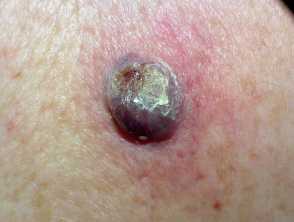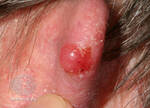
06 Oct Study Identifies Genes Linked to Nodular Melanoma
MedicalResearch.com Interview with:

Dr. Stark
Dr Mitchell Stark
B.App.Sc (Hons), PhD
UQ Amplify Senior Research Fellow
Skin Cancer Genomics and Biomarker Discovery Group Leader
Frazer Institute
Faculty of Medicine
The University of Queensland
Translational Research Institute
Woolloongabba, QLD 4102
MedicalResearch.com: What is the background for this study? What are the main findings?
Response: Nodular melanoma (NM) is one of the most aggressive subtypes of melanoma. Despite making up only 14 per cent of cases, it is the largest contributor to melanoma deaths.

One example of a nodular melanoma without pigment.
DermNetNZ image
Nodular melanoma is difficult to catch early because it grows fast and has often spread deeper in the skin by the time it’s diagnosed. Around a quarter of NM cases also appear as a skin-coloured tumour, which might go unnoticed for longer.
In this study we wanted to determine whether there were genetic variants associated with nodular melanoma, which might contribute to nodular melanoma risk.
We identified 39 genes with rare DNA variants which had the greatest frequency in nodular melanoma patients compared to non-NM patients.
MedicalResearch.com: What should readers take away from your report?
Response: We’ve known for a long time that having a close relative with a history of melanoma means an individual is at increased risk of developing the disease. What we didn’t have up to this point was any genetic risk factor specific to nodular melanoma.
What this study has shown us is that there are specific genetic variants in people’s DNA which could lead to increased risk for nodular melanoma.
MedicalResearch.com: What recommendations do you have for future research as a results of this study?
Response: More research is needed, but with the identified variants, genetic testing can help us screen to see who might be more at risk for developing nodular melanoma.
Once we know someone has these gene variants, they can be offered education and more appropriate screening to hopefully catch it earlier and improve patient outcomes.
Citation:
Stark MS, Sturm RA, Pan Y, Smit DJ, Kommajosyula V, Lee KJ, Jagirdar K, McLean C, Duffy DL, Soyer HP, Mar VJ. Assessing the genetic risk of nodular melanoma using a candidate gene approach. Br J Dermatol. 2023 Sep 28:ljad365. doi: 10.1093/bjd/ljad365. Epub ahead of print. PMID: 37766469.
https://pubmed.ncbi.nlm.nih.gov/37766469/
The information on MedicalResearch.com is provided for educational purposes only, and is in no way intended to diagnose, cure, or treat any medical or other condition.
Some links may be sponsored. Products are not endorsed.
Always seek the advice of your physician or other qualified health and ask your doctor any questions you may have regarding a medical condition. In addition to all other limitations and disclaimers in this agreement, service provider and its third party providers disclaim any liability or loss in connection with the content provided on this website.
